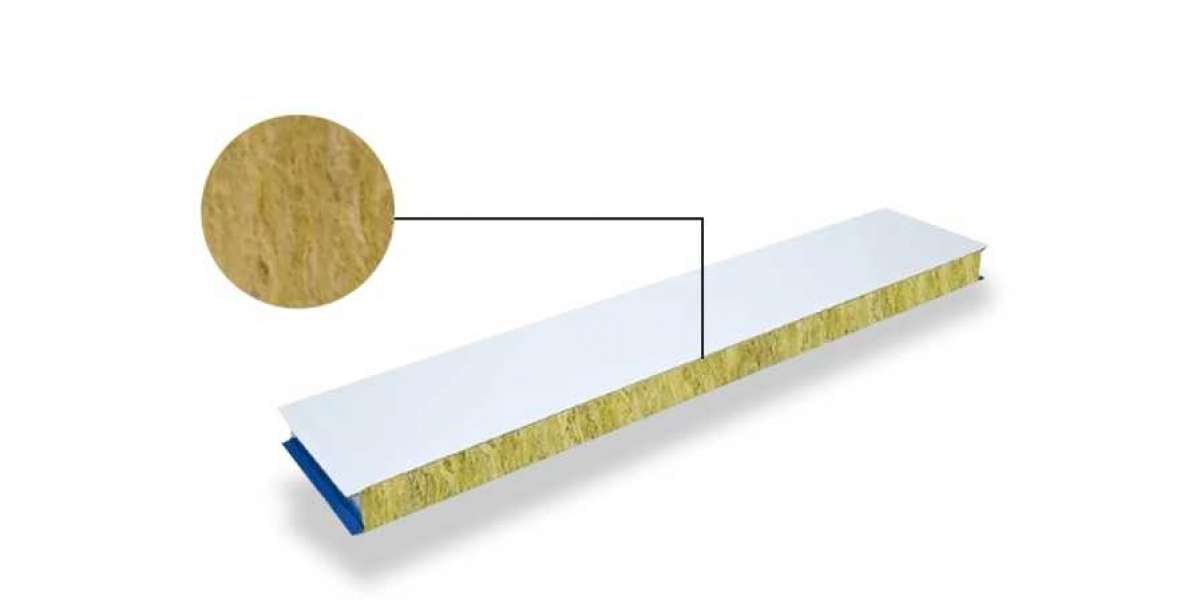In the pursuit of sustainable and environmentally friendly building materials, rock wool sandwich panels have emerged as a popular choice. These panels offer a range of benefits, from energy efficiency to fire resistance, making them an ideal solution for various construction projects. In this article, we will explore the features, advantages, and applications of rock wool sandwich panels, highlighting their contribution to sustainable building practices.
I. Understanding Rock Wool Sandwich Panels
Rock wool sandwich panels are composite building materials consisting of two outer layers and an inner core made of rock wool insulation. The outer layers, typically made of steel or aluminum, provide structural support and protection, while the rock wool core acts as an excellent insulator.
A. Composition and Manufacturing Process
1. Rock Wool Insulation: Rock wool is made from volcanic rock, primarily basalt, which is melted and spun into fibers. These fibers are then compressed and bonded together to form the insulation material.
2. Outer Layers: The outer layers of the sandwich panels are usually made of steel or aluminum, providing durability and resistance to external elements.
3. Bonding Process: The rock wool insulation is sandwiched between the outer layers using an adhesive or bonding agent, ensuring a strong and cohesive structure.

II. Advantages of Rock Wool Sandwich Panels
Rock wool sandwich panels offer numerous advantages that make them an attractive choice for sustainable construction projects.
A. Thermal Insulation
1. Energy Efficiency: The rock wool core provides excellent thermal insulation, reducing heat transfer and minimizing energy consumption for heating and cooling.
2. Temperature Regulation: The panels help maintain a comfortable indoor environment by preventing heat loss in winter and heat gain in summer.
B. Fire Resistance
1. Non-combustible Material: Rock wool is non-combustible, making the panels highly resistant to fire and contributing to the overall safety of the building.
2. Fire Barrier: The panels act as a barrier, preventing the spread of flames and limiting the damage caused by fire incidents.
C. Acoustic Insulation
1. Sound Absorption: Rock wool has exceptional sound absorption properties, reducing noise pollution and enhancing the acoustic comfort within buildings.
2. Noise Reduction Coefficient (NRC): The panels' NRC rating indicates their ability to absorb sound, making them suitable for applications in areas where noise control is crucial, such as theaters, recording studios, and conference rooms.
D. Durability and Longevity
1. Structural Integrity: The steel or aluminum outer layers provide strength and durability, ensuring the panels can withstand various environmental conditions.
2. Resistance to Moisture and Corrosion: Rock wool sandwich panels are resistant to moisture, preventing the growth of mold and mildew. Additionally, the outer layers protect against corrosion, extending the lifespan of the panels.
III. Applications of Rock Wool Sandwich Panels
Rock wool sandwich panels find extensive use in a wide range of construction projects, including:
A. Industrial Buildings: These panels are commonly used in warehouses, factories, and industrial facilities due to their fire resistance, thermal insulation, and durability.
B. Commercial Buildings: Rock wool sandwich panels are suitable for commercial structures such as offices, shopping malls, and hotels, providing energy efficiency and acoustic insulation.
C. Cold Storage Facilities: The panels' thermal insulation properties make them ideal for cold storage applications, maintaining a controlled temperature environment.
D. Residential Buildings: Rock wool sandwich panels can be used in residential construction, offering energy-efficient insulation and soundproofing benefits.

IV. Environmental Sustainability
Rock wool sandwich panels contribute to sustainable building practices in several ways:
A. Energy Efficiency: The panels' thermal insulation properties reduce energy consumption for heating and cooling, leading to lower carbon emissions and reduced reliance on fossil fuels.
B. Recyclability: Rock wool insulation can be recycled and reused, minimizing waste and reducing the environmental impact of construction projects.
C. Indoor Air Quality: Rock wool is an inert material that does not release harmful gases or volatile organic compounds (VOCs), ensuring a healthier indoor environment.
Conclusion
Rock wool sandwich panels offer a sustainable and environmentally friendly building solution with their thermal insulation, fire resistance, acoustic properties, and durability. As the construction industry continues to prioritize sustainability, these panels play a vital role in creating energy-efficient and safe buildings. By choosing rock wool sandwich panels, architects, builders, and homeowners can contribute to a greener future while enjoying the benefits of a high-performance construction material.
The Role of Machine Made Rock Wool Sandwich Panels in Soundproofing Buildings







